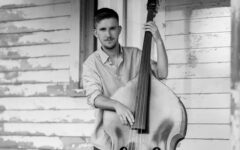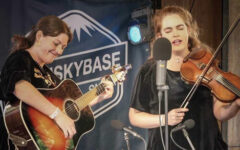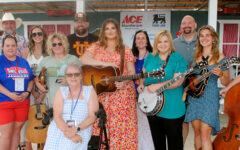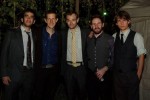 When Punch Brothers performed last month at Watermelon Park in Berryville, VA, Milo Farineau found a chance to speak with fearless leader and mandolinist Chris Thile and banjoist Noam Pikelny before the show.
When Punch Brothers performed last month at Watermelon Park in Berryville, VA, Milo Farineau found a chance to speak with fearless leader and mandolinist Chris Thile and banjoist Noam Pikelny before the show.
Milo also sent along photos he took during their set. He described the experience thusly:
“The guys were sitting around after their sound check when I sat down with them at their table. They couldn’t have been more gracious and kind. They gave a fantastic performance, and not one of them left until every fan in line after the show got an autograph or picture with them.”
The NY Times called you “bluegrass modernists” and Paste Magazine called you “musical aliens.” It seems that some of the media thinks you don’t want to be labeled “bluegrass,” so how would you describe yourselves?
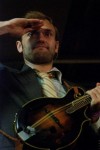 Chris: We don’t mind being considered a bluegrass band it’s only really traditional bluegrass bands who might not consider us bluegrass. We don’t care what people call us, we’re just going to play what we play. So the only trouble with the bluegrass thing is occasionally it gets to …….is that if people come expecting a certain thing we are very liable to disappoint them. So that’s the only issue. We love bluegrass and are proud to be associated with it to the extent that we are.
Chris: We don’t mind being considered a bluegrass band it’s only really traditional bluegrass bands who might not consider us bluegrass. We don’t care what people call us, we’re just going to play what we play. So the only trouble with the bluegrass thing is occasionally it gets to …….is that if people come expecting a certain thing we are very liable to disappoint them. So that’s the only issue. We love bluegrass and are proud to be associated with it to the extent that we are.
Noam: It means such a different thing to so many different people. There are some people who would consider Bela Fleck and the Flecktones bluegrass and I’m not trying to label them but bluegrass represents a different thing to every single person so it’s impossible to try to control what the word means. So much of what bluegrass means to me is something that I really love so when people consider us to be part of that tradition or at least the offshoots of that style, or recognizing that that’s where we come from something that’s something that makes me proud… but I know that a lot of people … would not agree and would not consider us a bluegrass band technically.
Tell us about the Steve Martin Prize for Excellence in Banjo and Bluegrass.
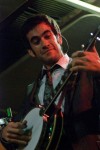 Noam: It was completely out of the blue, I had no idea that the award existed and just got a letter in the mail announcing this prize, saying they picked me and I thought it was a joke or something, then I saw all the signatures on there so I checked and then I realized this was a real thing. I was completely honored and I think it’s a wonderful thing that Steve and the entire board of directors have done for music and I really just was thrilled to accept this…on the first year.
Noam: It was completely out of the blue, I had no idea that the award existed and just got a letter in the mail announcing this prize, saying they picked me and I thought it was a joke or something, then I saw all the signatures on there so I checked and then I realized this was a real thing. I was completely honored and I think it’s a wonderful thing that Steve and the entire board of directors have done for music and I really just was thrilled to accept this…on the first year.
You guys are going to play with Steve Martin on Letterman November 2 4. Do you know what you’re going to play?
Noam: Not positive yet, but I’d say Rye Whiskey is a very likely candidate
[Fiddler] Gabe [Witcher] said you were trying to push this as far as you could without adding a drummer.
 Chris: I don’t really feel like there are any limitations with this ensemble. It’s as rich a group of instruments in textural possibilities as any. So I don’t really even see it as having to make up for not having drums. To me it makes a lot of sense. Drums overpower an acoustic ensemble, instantly. You put drums on an acoustic ensemble then you have to put pickups on the instruments and that sucks. Pickups on acoustic instruments just sounds terrible, so I think this ensemble makes a lot of sense. We’re heavily influenced by various bands that have drums, so occasionally we’ll emulate certain textures but I think, hopefully in a deeper way that…sounds like it wished it had drums, which definitely happens… hopefully it’s more of a natural thing.
Chris: I don’t really feel like there are any limitations with this ensemble. It’s as rich a group of instruments in textural possibilities as any. So I don’t really even see it as having to make up for not having drums. To me it makes a lot of sense. Drums overpower an acoustic ensemble, instantly. You put drums on an acoustic ensemble then you have to put pickups on the instruments and that sucks. Pickups on acoustic instruments just sounds terrible, so I think this ensemble makes a lot of sense. We’re heavily influenced by various bands that have drums, so occasionally we’ll emulate certain textures but I think, hopefully in a deeper way that…sounds like it wished it had drums, which definitely happens… hopefully it’s more of a natural thing.
I know you guys have some fun with covers, how did Dead Leaves and the Dirty Ground come about?
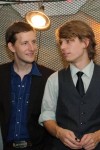 Noam: We’ve been playing that a while.
Noam: We’ve been playing that a while.
Chris: I just loved, I thought, the second I heard that song it sounded like a bluegrass song to me. I was just, even the White Stripes version of it is pretty bluegrassy to me, so it just seemed very natural to me.
Noam: I remember before we made How to Grow a Woman from the Ground we had this fantasy of getting Del to do Dead Leaves in the Dirty Ground, but then once this band was coming together we had to be selfish, and keep that to ourselves. (Chris laughs)


